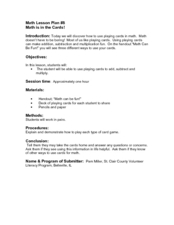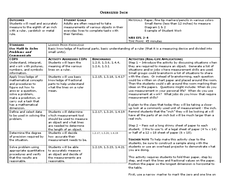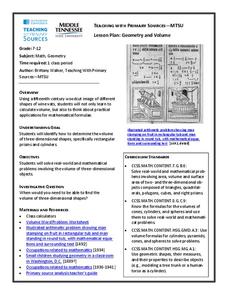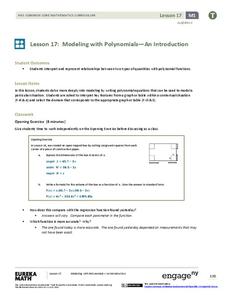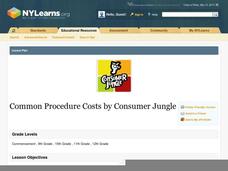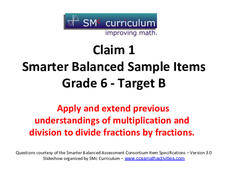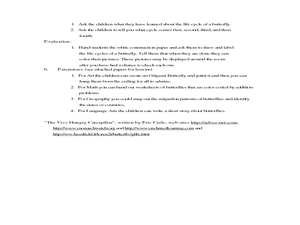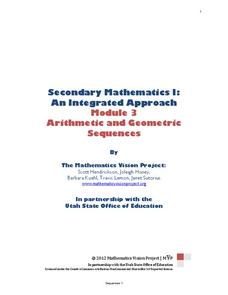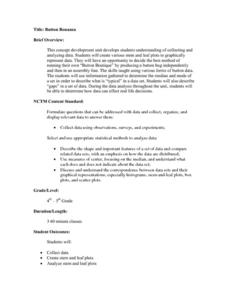Curated OER
Math is in the Cards!
Is the rainy day schedule disrupting your class? Here is a great way to practice basic addition, subtraction, and multiplication skills while building automaticity and problem solving. This activity provides the rules to three different...
Curated OER
Symbols in Algebra
Learners name and sketch numerical expressions. For this order of operation lesson, students add, subtract, multiply and divide using the correct order of operation. They perform four specific calculations for their motivation lesson.
Curated OER
Elementary Statistics in Life
Students examine newspapers for graphs. They collect and sort data that is of interest to them. They enter data into a database and make comparisons using the information.
Curated OER
Oversized Inc
Fourth graders become familiar with fractional parts of a ruler. In this measurement lesson, 4th graders measure various objects to an 1/8 of an inch. Students measure a piece of paper based on teacher direction. Students discuss the...
Virginia Department of Education
Geometry and Volume
The history of math is fascinating! Utilize a woodcut primary source image from 1492 and posters from the 1930s to help geometers apply their volume-calculation skills to real-life questions.
EduGAINs
Making Savvy Consumer Choices
It's never too early to learn about grocery budgeting. Middle schoolers delve into the world of consumer math with a lesson that focuses on both healthy choices and real-world math applications. Groups work together to form a grocery...
EngageNY
Modeling with Quadratic Functions (part 1)
Relevance is key! The resource applies quadratic modeling by incorporating application of physics and business. Pupils work through scenarios of projectile motion and revenue/profit relationships. By using the key features of the graph,...
EngageNY
Modeling with Polynomials—An Introduction (part 2)
Linear, quadratic, and now cubic functions can model real-life patterns. High schoolers create cubic regression equations to model different scenarios. They then use the regression equations to make predictions.
Curated OER
Common Procedure Costs
Kids never think about the cost of medical expenses, because they never think they'll get hurt. To better understand personal financial planning, learners research common medical procedures and their costs. They use a worksheet and the...
Curriculum Corner
St. Patrick's Day Color Key Addition
Young leprechauns solve basic addition facts and use a color key to bring a set of St. Patrick's Day-themed sheets to life.
CCSS Math Activities
Smarter Balanced Sample Items: 6th Grade Math – Target B
Are you tired of hearing "When am I ever going to need to use this in real life?" Cooking word problems, in addition to other math work, answer the question easily. Grade 6 Claim 1 Item Slide Shows offers eight problems reinforcing...
Practical Money Skills
Making Decisions
Money represents decisions: spending decisions, saving decisions, and investing decisions. Encourage young adults to think about the decisions they make with their money in a three-day unit about personal finance, consumer spending, and...
Teach Engineering
What's Wrong with the Coordinates at the North Pole?
Here is an activity that merges technology with life skills as individuals use Google Earth to explore the differences between coordinate systems and map projections. The self-guided instructional activity is the fourth segment in a...
Curated OER
Reading, Writing, And Math in Daily Living
Students, in groups, make chocolate chip cookies following a recipe.
Curated OER
Look for Patterns: Quilts in Two Faith Ringgold Stories
Author Faith Ringgold uses quilts to illustrate her books Tar Beach and Aunt Harriet's Underground Railroad. In this integrated trio of activities, young scholars read stories, identify and create patterns, and design quilt squares of...
Curated OER
Math Prefixes
Young scholars use a dictionary to gather appropriate information for writing simple definitions. They recognize prefixes that relate to numbers, such as mono-, bi-, and tri-. Pupils use their creative abilities to extrapolate new words...
Curated OER
Real Life Algebra
Students investigate where in their everyday life math is used. In this algebra lesson, students describe linear transformation as it relates to business and sales. They relate area and perimeter to their yard or garden, as well as...
Curated OER
The Lifecycle of a Butterfly
Students study the life cycle of the butterfly. In this butterfly life cycle lesson, students examine and discuss a large diagram of the four stages of the butterfly life cycle. They read books and access web sites that extend their...
Curated OER
M&M Science and Math
A series of math and science activities feature M&M's® as manipulatives to help kids work through equations. The resource includes exercises on finding averages, percent of compositions, moles in chemical reactions, genotypes and...
EngageNY
Piecewise and Step Functions in Context
Looking for an application for step functions? This activity uses real data to examine piecewise step functions. Groups create a list of data from varying scenarios and create a model to use to make recommendations to increase revenue.
Baylor College
Needs of Living Things: Pre-Assessment
Determine your class's prior knowledge about the necessities of life with this pre-assessment for a unit on living things. Learners draw pictures of themselves with all the things they need to live, grow, and survive. These drawings will...
PBS
Adding Integers
Your sixth and seventh graders deepen their understanding of a number line and adding integers in this concrete, hands-on activity. Learners play "Warehouse Puzzle" and then discuss their game strategies and the characteristics...
Mathematics Vision Project
Module 3: Arithmetic and Geometric Sequences
Natural human interest in patterns and algebraic study of function notation are linked in this introductory unit on the properties of sequences. Once presented with a pattern or situation, the class works through how to justify...
Curated OER
Button Bonanza
Collections of data represented in stem and leaf plots are organized by young statisticians as they embark some math engaging activities.


